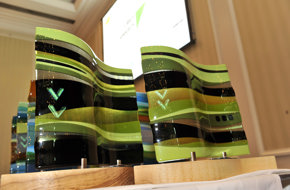Highlights
- Strong culture involving staff of all levels to continually improve productivity, reduce utility costs and increase recycling rates.
- Integrated and accredited Environmental Management System.
- Over the last 3 years:
- energy consumption reduced from 1374 kwh to 1268 kwh
- water consumption reduced by 20% from 89 litres to 70.8 litres
- amount of waste sent to landfill reduced by 189.9 tonnes to 98.4 tonnes
- cardboard recycling increased by 43% from 11 tonnes to 19 tonnes
- sulphur emissions reduced by 33% and nitrous oxide by 50%.
- Overall, BRP has prevented the release of 1.5 tonnes of CO2 emissions into the atmosphere.
- Recycles 95,000 tonnes of waste polythene annually.
- BRP operates a cycle-to-work scheme whereby staff can get tax relief on the purchase of bicycles.

BRP is a manufacturer of refuse and recycling sacks, recycled plastic furniture and films for the constructions industry (damp-proof membranes and courses, etc.). It has four sites, one of which is in Dumfries, employing 45 people. This site is dedicated largely to the recycling of agricultural polythene waste (e.g. silage balewrap and sheeting). Thanks to a sustained investment in new technology, including a recent £2 million upgrade to the wash plant, BRP can turn the waste wrapping into recyclable products, which the judges were very impressed with.
The business is Europe’s largest recycler of waste polythene, recycling 95,000 tonnes annually. By recycling this waste, the material might otherwise be sent to landfill or exported abroad for recycling, which would result in a large carbon footprint.
BRP Dumfries achieved ISO14001 Environmental Management accreditation in 2010, and ISO18001 and ISO9001 have been accredited and maintained since 2011.
Between 2009 and 2011 BRP Dumfries has:
- reduced energy consumption from 1374 kwh to 1268 kwh per tonne of finished goods
- reduced water consumption by ~20% (89 litres to 70.8 litres)
- reduced waste to landfill by ~24% (128.9 tonnes to 98.4 tonnes)
- increased cardboard recycling by ~43% (11 tonnes to 19 tonnes).
The judges were delighted to see how prominent recycling awareness is around the site, particularly the video run in the reception area, which shows how recycling is carried out on the site, and how information is rolled out at training sessions with staff. A particular highlight for the VIBES judges was the breadth of knowledge demonstrated by BRP’s environmental champion on site, Mark Jacyszyn. The judges were also impressed with the strong reporting and monitoring of environmental targets.
Staff buy-in is crucial to its success; as such, BRP operates a cycle-to-work scheme whereby staff can get tax relief on bicycles. Also, any member of staff can report any maintenance, health and safety, environmental, quality or non-conformance issue to management on a single-page form. This means trends can be established quickly and acted upon.
The environmental policies in places at BRP Dumfries have reduced waste disposal, packaging, transport and energy costs. As a result, more money has been available for re-investment into the site. By contributing to reduced costs and greater financial strength, the environmental policies in place enable BRP to offer long-term employment in the local area.
Following the success of activities in Dumfries, BRP unveiled new and enhanced capabilities at its plant in Rhymney, South Wales are using the expertise of the Dumfries staff who knew what worked well and what didn’t. This site can now accept and recycle similar types of agricultural waste as the Dumfries site.
Locally, BRP has worked closely with three local schools and has been involved in the Warburton scheme whereby children keep bread wrappers for recycling. The business also encourages staff to support local ‘Guid Nychburris’ week and charity walks, among other local events.
Overall, BRP showed outstanding waste and resources monitoring and reductions. The VIBES judges were impressed by the environmental commitment by staff at all levels.